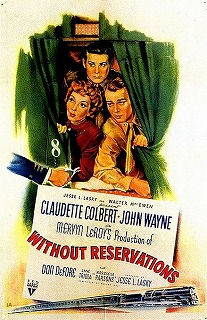Plot
Successful author Christopher "Kit" Madden is traveling to Los Angeles to work on the film adaptation of her bestselling book Here is Tomorrow, which was supposed to star Cary Grant as the Army Air Forces pilot hero Mark Winston. But she receives word that Grant has withdrawn and the producer now wants an unknown actor to play Winston opposite Lana Turner. Kit, on the train to Hollywood, is writing the producer that she'll accept nobody but Grant to star as Winston when she meets two Marine pilots, captain "Rusty" Thomas and first lieutenant "Dink" Watson, and instantly considers Rusty the best choice to play Winston. But he is dismissive of her book and says it is a political allegory, and that he does not believe that Grant would refuse Turner's advances for 400 pages. Unsure how he will react if he discovers that she is a famous writer, Kit keeps her identity secret, saying that her name is Kitty Kloch.
After she is expelled from the train for drunkenness in a remote prairie town, and the two men join her, they trade Rusty's German war souvenir helmet for a car. They are welcomed at the farm of a large Hispanic family whose daughter showers attention on Rusty, but they flee following a misunderstanding which Madden intentionally causes. When Rusty finally learns Kit's true identity after bailing her out of jail for cashing a check which the hotel believed was under a false identity, he thinks that she has been using him just so that he will appear in the film. However, after weeks pass while she tries to make Rusty jealous by appearing in newspapers with other men, Rusty eventually reaches Hollywood and they resolve their differences.
This page is based on this
Wikipedia article Text is available under the
CC BY-SA 4.0 license; additional terms may apply.
Images, videos and audio are available under their respective licenses.
